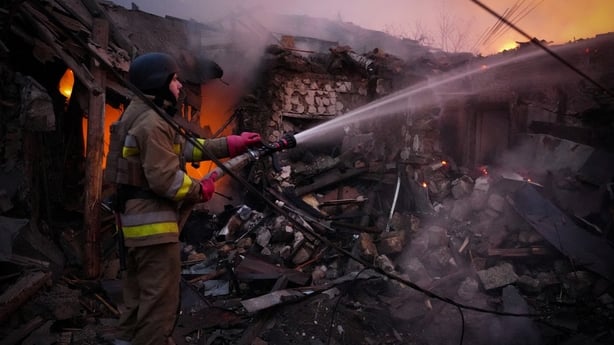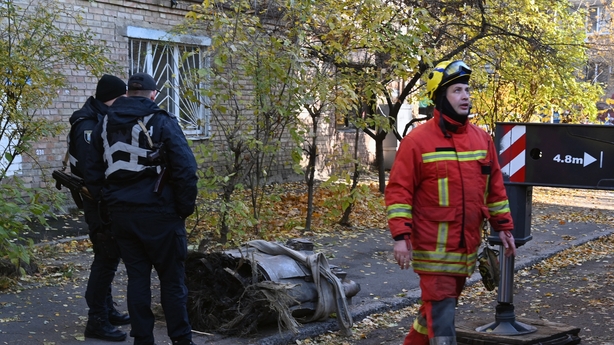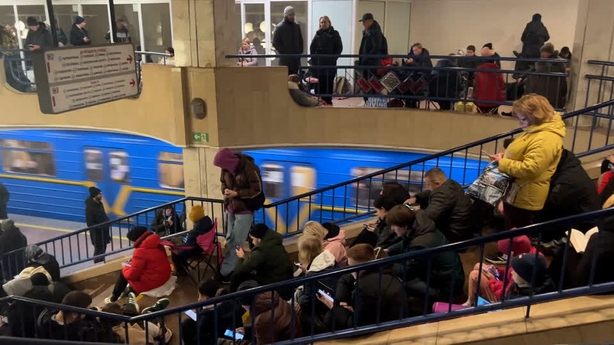US President Joe Biden's administration has allowed Ukraine to use US-made weapons to strike deep into Russia, two US officials and a source familiar with the decision said, in a significant reversal of its policy in the Ukraine-Russia conflict.
Ukraine plans to conduct its first long-range attacks in the coming days, the sources said, without revealing details due to operational security concerns.
Ukrainian President Volodymyr Zelensky said the missiles would "speak for themselves", following reports of the US authorisation.
"Today, many in the media are saying that we have received permission to take appropriate actions. But strikes are not made with words. Such things are not announced. The missiles will speak for themselves," he said in his evening address.
The move comes two months before President-elect Donald Trump takes office on 20 January and follows months of pleas by Mr Zelensky to allow Ukraine's military to use US weapons to hit Russian military targets far from its border.
The White House declined to comment.
The change comes as Ukraine said it would introduce nationwide emergency power restrictions after a "massive" Russian attack further damaged its already fragile energy grid ahead of a much-feared winter, with nine civilians also killed across the country.
We need your consent to load this rte-player contentWe use rte-player to manage extra content that can set cookies on your device and collect data about your activity. Please review their details and accept them to load the content.Manage Preferences
Ten people, including two children, were killed and 52 were injured when a Russian missile hit a residential nine-storey building in Ukraine's northeastern region of Sumy, Ukraine's emergency services and military said.
Mr Zelensky said Russia also launched 120 missiles and almost 100 drones, targeting Kyiv as well as southern, central and far-western corners of the country.
Civilians were killed in the Mykolaiv, Lviv, Kherson, Dnipropetrovsk and Odesa regions in what officials in the capital called one of the biggest barrages in the almost three-year Russian invasion.
The devastation comes at a time when Russia has been steadily advancing in Ukraine's east and with the imminent return of Donald Trump to the White House, raising fears over the future of US support for Ukraine.
"A hellish night," the spokesman for Ukraine's air force, Yuriy Ignat, said on social media, adding that Kyiv had downed "144 targets".
The country's grid operator Ukrenergo said it would apply emergency measures in all regions.
"Tomorrow, 18 November, all regions will be forced to apply consumption restriction measures," Ukrenergo posted on social media.
"The reason for the temporary return of restrictions is the damage to power facilities during today's massive missile and drone attack."
Almost three years of war with Russia has already destroyed half of Ukraine's energy production capacity, Mr Zelensky has warned.
With the harsh Ukrainian winter fast approaching, the country is already suffering from major energy shortfalls, while its outmanned and outgunned forces have been ceding ground to the Kremlin's troops for weeks.
The giant attack followed two days after German Chancellor Olaf Scholz called Russian leader Vladimir Putin for the first time in almost two years, urging the Kremlin chief to end Russia's devastating offensive.
'True response'
Ukraine's government had slammed Mr Scholz for reaching out to Putin and said that the attack was the Kremlin's real answer.
"This is war criminal Putin's true response to all those who called and visited him recently," Ukrainian Foreign Minister Andriy Sybiga said after the attack.
"We need peace through strength, not appeasement."
Mr Scholz defended the call and insisted that Germany's backing for Ukraine was unwavering.

"Ukraine can count on us," he said before flying to a G20 meeting in Brazil, promising that "no decision will be taken behind Ukraine's back" on ending the conflict.
But Poland's Prime Minister Donald Tusk joined the backlash.
"No one will stop Putin with phone calls. The attack last night, one of the biggest in this war, has proved that telephone diplomacy cannot replace real support from the whole West for Ukraine," Mr Tusk wrote on X.
The strikes caused extensive power cuts across the country, with fears of a precarious winter to come.
"A massive attack on our country," Mr Zelensky said.
"Over the past week, the aggressor used nearly 140 missiles of various types, more than 900 guided aerial bombs, and over 600 strike drones," he said, accusing the Russian government of trying to "intimidate us with cold and blackouts".
Civilian deaths across Ukraine
AFP journalists heard explosions in the early morning in Kyiv and close to Sloviansk in the Donetsk region.
Russia, meanwhile, said it had hit all its targets, claiming it had targeted an "essential energy infrastructure supporting the Ukrainian military-industrial complex".

But civilian deaths were reported across the country.
Officials in Kherson said a 51-year-old woman was killed by a drone.
In the southern Mykolaiv region, local leader Vitaliy Kim said two women were killed in a night attack and seven people - including two children - were wounded.
The death toll included two employees of the state railway company Ukrzaliznytsia in the city of Nikopol, who were killed when a depot was hit, the Dnipropetrovsk region's governor Sergiy Lysak and the operator said. Three others were wounded in the bombing.
Two people were also killed in the Odesa region, where a teenager was wounded.
Read more about Russia's invasion of Ukraine
Russian drones also made their way to Zakarpattia, a mountainous region rarely targeted, with officials saying fragments fell in the village of Pavshyno, near the border with Hungary and Slovakia.
The head of the Lviv region, Maksym Kozytsky, said a 66-year-old woman was killed in her car in Sheptytsky, a village around 20km from the Polish border.

That prompted NATO-member Poland to scramble fighter jets and mobilise all available forces in response.
Poland puts its armed forces on alert whenever attacks against its neighbouring country are deemed likely to create a danger for its own territory.
Two killed in Russia
In the border Kursk region, where Kyiv has held onto swathes of Russian land since the summer, Russian officials said a Ukrainian drone strike killed a local journalist.
Kursk leader Alexei Smirnov said Yulia Kuznetsova, editor of the local "People's Paper", was killed in the Bolshesoldatskiy district as she "took archives to her editorial office".
The West and Ukraine says thousands of North Korea soldiers are in Russia, with some in the Kursk region, to reinforce Moscow's forces.
Russia also said a man was killed by a Ukrainian drone in its border Belgorod region.

